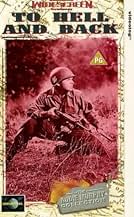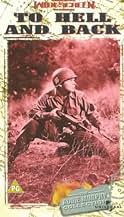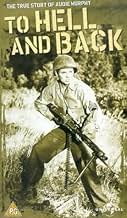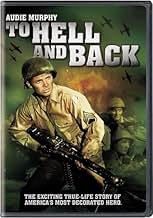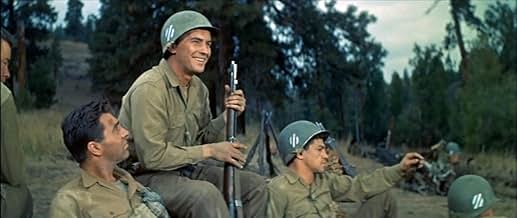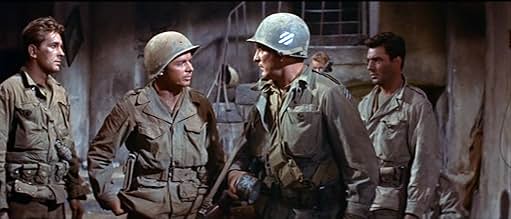IMDb RATING
7.1/10
6.4K
YOUR RATING
The true WWII story of Audie Murphy, the most decorated soldier in U.S. history. Based on the autobiography of Audie Murphy who stars as himself in the film.The true WWII story of Audie Murphy, the most decorated soldier in U.S. history. Based on the autobiography of Audie Murphy who stars as himself in the film.The true WWII story of Audie Murphy, the most decorated soldier in U.S. history. Based on the autobiography of Audie Murphy who stars as himself in the film.
- Awards
- 1 nomination total
- Director
- Writers
- All cast & crew
- Production, box office & more at IMDbPro
7.16.3K
1
2
3
4
5
6
7
8
9
10
Featured reviews
A movie given a great boost by Life magazine
Quite often I see a movie then seek out the book but when I came to the US from Canada when I was 13 the first purchase I made was the paperback version of "To Hell and Back" ($0.35). Of course Audie Murphy is perfectly cast and gives a performance far superior to any of his subsequent movie roles. The others, notably Marshall Thompson, Jack Kelly, David Janssen and Art Aragon give satisfying performances. In many ways this was the "Saving Private Ryan" of its time for its "realistic" portrayal of the foot soldier in WW 2. Life magazine boosted the audience for this film when it put Murphy on the cover and emphasized that the story was true. I think that it works because Murphy doesn't look like the typical movie hero. The book is once again available in a new larger page-size paperback.
Decent and interesting biography about Audie Murphy who enlists Army where makes a brilliant career
This is the thrilling and exciting true-life story of America's most decorated . The authentic WWII story of Audie Murphy , the most decorated soldier in U.S . history . Based on the autobiography of Audie Murphy who stars as himself in the film from his up-bringing as the son of Texas sharecroppers , as his mother dies and he remains orphan and caring his kiddies brothers . He , then , applied for service with the Navy , the Marines and the Army he was turned down by all three branches . However , when he joined his combat unit, one of his superiors considered transferring him out of the company for being unfit for combat . As Audie wages war in Casablanca , Tunez ; he and his detachment (formed by Marshall Thompson , Charles Drake , Jack Kelly , among others) go to Sicily , Palermo until Messina . Later on , they land at Salerno , Naples , Anzio and MountCassino . After that , Murphy and his III Infantry Division formed by valiant ¨Dogfaces¨ (it was a term used during World War II to describe US Army combat infantrymen) disembark in France where take place other bloody battles . As Audie takes on hundreds of enemy soldiers with a machine gun mounted on a tank and he fought in seven major campaigns during World War II .
Acceptable picture based on actual events about about Audie Murphy who plays himself following his Army career in WWII . Murphy won more tan 20 medals , being the most decorated American soldier , including the Congressional Medal of Honor and he was also awarded five decorations by France and Belgium . Features impressive as well as realistic battle scenes punctuated with great heroics sequences . This rendition of Murphy autobiography was professionally directed by Jesse Hibbs and it was a box-office hit for Universal Pictures and its record was apparently not broken until Jaws (1975). Hibbs was an American director of second features , primarily westerns , at Universal in the 1950's . Being especially known for TV series as ¨Perry Mason¨ (1957) , ¨Gunsmoke¨ , ¨Laramie¨ and ¨F.B.I.¨ (1965) as well as Westerns and Thrillers . He directed various Audie Murphy vehicles such as : this ¨To hell and Back¨ (1955) , ¨World in My Corner¨ (1956) , ¨Ride a Crooked Trail¨ (1958) and ¨Medal of Honor¨ .
Based on facts , these are the following ones : The film describes especially the Italian campaign , when Eisenhower and the Allied command is convinced by Winston Chuchill and his General Brook to carry out the Italian invasion . Then , there takes place the ¨Husky Operation¨ (July , 1943) , but it didn't coordinate Montgomery's 8ª Army and Clark's 5ª Army against German General FeldMarschall, Albert Kesselring , and it resulted in a disaster . Kesselring designs the impregnable ¨Gustav line¨ in South Rome and the main bastion : Montecassino . Then , there happens the famous disaster of Anzio and Nettuno under command of General John Lucas . The Allied army formed by 28 Divisions have a hard and complex mission to their destination .
Acceptable picture based on actual events about about Audie Murphy who plays himself following his Army career in WWII . Murphy won more tan 20 medals , being the most decorated American soldier , including the Congressional Medal of Honor and he was also awarded five decorations by France and Belgium . Features impressive as well as realistic battle scenes punctuated with great heroics sequences . This rendition of Murphy autobiography was professionally directed by Jesse Hibbs and it was a box-office hit for Universal Pictures and its record was apparently not broken until Jaws (1975). Hibbs was an American director of second features , primarily westerns , at Universal in the 1950's . Being especially known for TV series as ¨Perry Mason¨ (1957) , ¨Gunsmoke¨ , ¨Laramie¨ and ¨F.B.I.¨ (1965) as well as Westerns and Thrillers . He directed various Audie Murphy vehicles such as : this ¨To hell and Back¨ (1955) , ¨World in My Corner¨ (1956) , ¨Ride a Crooked Trail¨ (1958) and ¨Medal of Honor¨ .
Based on facts , these are the following ones : The film describes especially the Italian campaign , when Eisenhower and the Allied command is convinced by Winston Chuchill and his General Brook to carry out the Italian invasion . Then , there takes place the ¨Husky Operation¨ (July , 1943) , but it didn't coordinate Montgomery's 8ª Army and Clark's 5ª Army against German General FeldMarschall, Albert Kesselring , and it resulted in a disaster . Kesselring designs the impregnable ¨Gustav line¨ in South Rome and the main bastion : Montecassino . Then , there happens the famous disaster of Anzio and Nettuno under command of General John Lucas . The Allied army formed by 28 Divisions have a hard and complex mission to their destination .
"Private Murphy Reporting for Duty!!"
When Audie Murphy emerged from the Second World World as the most decorated soldier in American military history (having personally killed about 240 enemy soldiers) it was a logical step that such a good-looking kid was promptly snapped up by Hollywood.
After so many roles in a setson it comes as something of a surprise to finally see him in combat gear in this glossy screen version in Technicolor and CinemaScope of his ghostwritten memoirs which probably boasts a higher death rate than all his westerns put together.
Director Jess Hibbs later recalled that the camera would occasionally catch a strange look in his eye and that take would have to be scrapped. The damage Murphy suffered (which followed him long into civilian life) is never really apparent in the film however and he seems to take it all in his stride.
After so many roles in a setson it comes as something of a surprise to finally see him in combat gear in this glossy screen version in Technicolor and CinemaScope of his ghostwritten memoirs which probably boasts a higher death rate than all his westerns put together.
Director Jess Hibbs later recalled that the camera would occasionally catch a strange look in his eye and that take would have to be scrapped. The damage Murphy suffered (which followed him long into civilian life) is never really apparent in the film however and he seems to take it all in his stride.
A good soldier's story, played by "THE REAL McCOY"
I've always Liked watching Audie Murphy's movies since I was a child. I guess it also had to do with the fact that he had that baby face. Being a combat wounded Viet Nam vet, I can relate to his ordeal during and after the war. This man was a caring man who thought of others. Like many other "Medal of Honor" winners; he like the others are not the movie RAMBO hero. They Are "THE REAL McCOYS" It's ironic, though. His last movie in 1971 was called "A time for dying"[A Jesse James movie.] In that same year he died in a small plane crash. A friend of his had once said," all those Germans could not kill him,yet a plane crash near home took his life." My last words are, "May he be with the Lord."
AUDIE MURPHY: the Man, the Legend, the Hollywood Star
Let's face it; in a world of computers and egotists so far absent of true human contact and chivalry, Audie Murphy will forever shine brightly and ever brighter as a true man. He is perhaps the last real genuine American hero, as we slip into a vortex world of lawyers, statistics, and scams.
1.) At the age of 12, he chose to be a man by taking over his absentee father's role in his family; he literally fed his dirt poor family by putting meat on the table with a keen eye and a broken down .22 rifle. Working two jobs at this age, he still wrote cursively w/ excellent spelling and diction when he had to quit his education. This is something half of the high schoolers of today can't do as they "rap" themselves in hedonistic pursuits of clothes, breeding without responsibility, drugs, cell phones, and a disregard for another person's respect and rights.
2.) After multiple attempts to join our country's armed forces, he became the most highly decorated soldier in our nation's history, with countless feats of heroism (please see WWW.AUDIEMURPHY.COM.).
3.) He achieved Hollywood star status with his tough yet tender persona.
In a current world of 50 cents, we can look back to a time when a man was truly a man, and that man was the United States Medal of Honor Winner: AUDIE MURPHY.
1.) At the age of 12, he chose to be a man by taking over his absentee father's role in his family; he literally fed his dirt poor family by putting meat on the table with a keen eye and a broken down .22 rifle. Working two jobs at this age, he still wrote cursively w/ excellent spelling and diction when he had to quit his education. This is something half of the high schoolers of today can't do as they "rap" themselves in hedonistic pursuits of clothes, breeding without responsibility, drugs, cell phones, and a disregard for another person's respect and rights.
2.) After multiple attempts to join our country's armed forces, he became the most highly decorated soldier in our nation's history, with countless feats of heroism (please see WWW.AUDIEMURPHY.COM.).
3.) He achieved Hollywood star status with his tough yet tender persona.
In a current world of 50 cents, we can look back to a time when a man was truly a man, and that man was the United States Medal of Honor Winner: AUDIE MURPHY.
Did you know
- TriviaA total of 50,000 rounds of ammunition, 300 pounds of TNT, 600 pounds of blasting powder and ten cases of 40% dynamite were required for the filming of the battle scenes.
- GoofsDuring Audie Murphy's Medal of Honor ceremony at the end of the movie, the narrator makes two mistakes as he describes the other decorations for valor that Murphy received: he mentions "a Bronze Star Medal" (Murphy actually received two BSM's); and "a Bronze Star Medal with bronze service arrowhead" (the correct award is the European-African-Middle Eastern Campaign Medal with Bronze Service Arrowhead). The narrator also omits two significant awards that Murphy earned: two Presidential Unit Citations and the Combat Infantryman's Badge.
- Alternate versionsWest German theatrical version was cut by approx. 5 minutes.
- ConnectionsEdited into The Young Warriors (1967)
Details
- Runtime
- 1h 46m(106 min)
- Aspect ratio
- 2.55 : 1
Contribute to this page
Suggest an edit or add missing content


